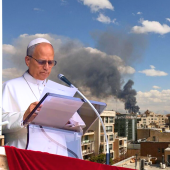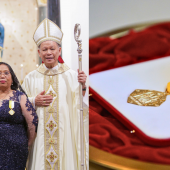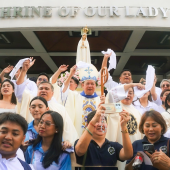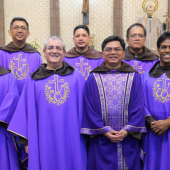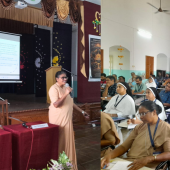Holy See and Indonesia Celebrate 75 Years of Diplomatic Friendship with Commemorative Stamp
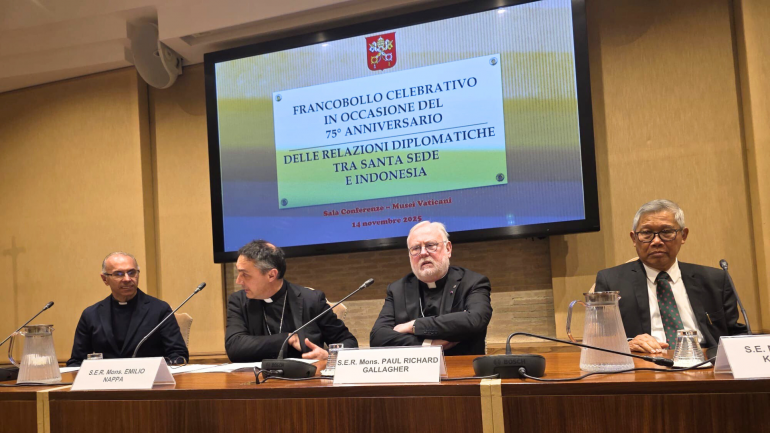
The Holy See and the Republic of Indonesia celebrated 75 years of diplomatic relations with the unveiling of a commemorative postage stamp at the Vatican Museums’ Conference Room on November 14, marking a milestone in their enduring friendship rooted in faith, dialogue, and mutual respect.
The solemn ceremony, attended by Church and state dignitaries, underscored the deep and unique relationship between the world’s largest Muslim-majority nation and the Catholic Church.
Among those present were Archbishop Paul Richard Gallagher, Secretary for Relations with States and International Organizations of the Holy See; Monsignor Émile Nampa, Secretary General of the Governorate of Vatican City State; and H.E. Mr. Mikael Trias Kuncahyono, Ambassador of the Republic of Indonesia to the Holy See.
The special stamp, designed by Patrizio Daniele, features the crossed keys of Saint Peter and the Garuda Pancasila, Indonesia’s national emblem. Together, these symbols represent unity, friendship, and the shared moral vision that has shaped bilateral ties for more than seven decades.
Friendship Rooted in Moral and Spiritual Values
In his address, Archbishop Gallagher reflected on the moral and spiritual foundations that underpin relations between the Holy See and Indonesia.
He linked the proclamation of Indonesia’s independence in 1945 with Pope Pius XII’s 1939 encyclical Summi Pontificatus, which emphasized the unity of the human family and the primacy of universal moral values.
“The Holy See’s engagement in international affairs,” Archbishop Gallagher said, “goes beyond legal principles; it is a moral and spiritual mission to promote the human person in all dimensions: physical, moral, and spiritual.”
He stressed that Vatican diplomacy is not guided by political or economic interest but by the Gospel imperative to “love one another as I have loved you.”
The Archbishop commended Indonesia for embodying principles that resonate deeply with the Holy See’s vision, particularly those of Pancasila, the nation’s foundational philosophy that upholds faith in God, unity in diversity, and social justice.
He also acknowledged the Church’s ongoing contributions in education, healthcare, and social service across Indonesia, despite being a minority faith.
“As we commemorate 75 years of diplomatic relations,” he concluded, “our shared commitment to harmony and peace will continue to sustain and inspire our cooperation, for the next 75 years and beyond.”
A Tribute to Dialogue and Growth
Monsignor Émile Nampa, Secretary General of the Governorate of Vatican City State, described the celebration as “a moment of deep gratitude and joy,” reflecting on the flourishing ties between the Vatican and Indonesia.
He praised the Indonesian Catholic community for its vitality and missionary spirit, which continues to enrich the life of the universal Church.
“The dialogue between the Catholic Church and Indonesian institutions,” Monsignor Nampa said, “has been continually strengthened and enriched, supported by the vitality of these growing Christian communities.”
Highlighting the symbolic power of the stamp, he said it goes beyond its role as a collector’s item, standing instead as a “testament to friendship, mutual respect, and shared commitment to peace and human dignity.”
The stamp’s design, blending Saint Peter’s keys and the Garuda Pancasila, represents, he said, “a dialogue between faith and culture” and a sign of enduring unity.
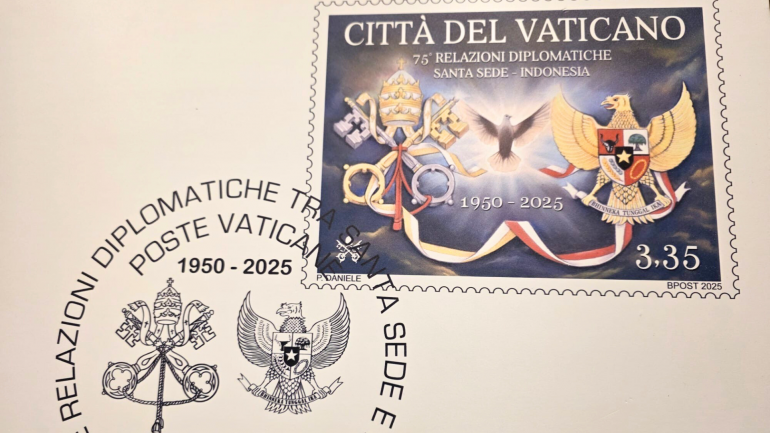
Stamps as Messengers of Friendship
In his heartfelt remarks, Indonesian Ambassador Mikael Trias Kuncahyono expressed gratitude to the Vatican for its collaboration in creating the commemorative stamp, calling it “a symbol of friendship, history, and shared values.”
He recalled that the Holy See was among the first to recognize Indonesia’s independence in 1947, demonstrating solidarity and respect for the newly born republic.
Formal diplomatic relations were established in 1950, paving the way for seven decades of cooperation in peacebuilding, education, humanitarian work, and interreligious dialogue.
“A stamp,” Ambassador Kuncahyono said, “is not merely a means of paying postage, it is a storyteller, a cultural messenger that promotes understanding and friendship among nations.”
Even in the digital age, he added, stamps remain tangible symbols of heritage and unity. The ambassador also noted the significant global contribution of over 1,600 Indonesian priests, religious brothers, and sisters serving around the world, many of them in Italy, as living bridges between Indonesia and the Holy See.
“The design and imagery of this stamp,” he concluded, “reflect the shared values of the Republic of Indonesia and the Holy See, faith in God, human dignity, unity in diversity, and social justice.”
A Testament to Dialogue and Peace
The unveiling of the commemorative stamp not only celebrated a historic diplomatic milestone but also reaffirmed the shared mission of the Holy See and Indonesia to foster dialogue, peace, and human solidarity.
As both sides look toward the future, the event stood as a powerful reminder that diplomacy, when guided by faith and mutual respect, can become a genuine bridge of understanding between cultures, religions, and nations.
Radio Veritas Asia (RVA), a media platform of the Catholic Church, aims to share Christ. RVA started in 1969 as a continental Catholic radio station to serve Asian countries in their respective local language, thus earning the tag “the Voice of Asian Christianity.” Responding to the emerging context, RVA embraced media platforms to connect with the global Asian audience via its 21 language websites and various social media platforms.









